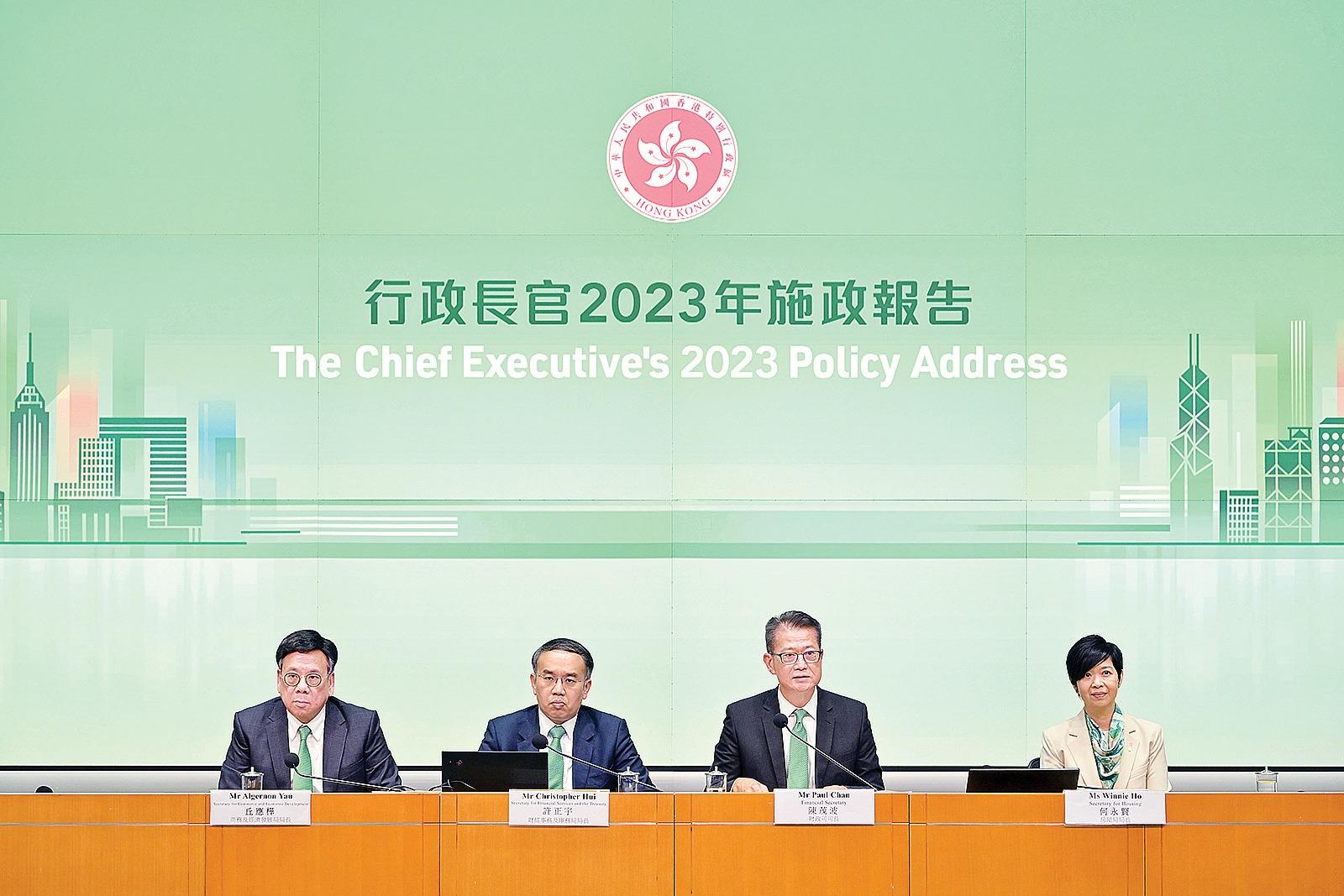 Financial Secretary Paul Chan Mo-po (second from right) speaks at a news conference at the Government Complex in Admiralty on Oct 26, 2023. (PHOTO / HKSAR GOVERNMENT)
Financial Secretary Paul Chan Mo-po (second from right) speaks at a news conference at the Government Complex in Admiralty on Oct 26, 2023. (PHOTO / HKSAR GOVERNMENT)
Hong Kong Financial Secretary Paul Chan Mo-po said that he anticipates that the fiscal deficit will surpass earlier projections for this financial year in light of declining revenues from stamp duties and land sales, adding that the Hong Kong economy should be assessed over the full economic cycle.
“When examining Hong Kong’s economy, however, one should focus on the entire cycle. Achieving an overall economic balance is paramount, rather than a yearly deficit or surplus, as economic cycles have inevitable highs and lows,” Chan said on Thursday at a news conference detailing the 2023 Policy Address.
“Given its status as a small, fully open economy, Hong Kong’s tax revenue fluctuates in tandem with the economic environment,” he added.
Chan noted that the introduction of more high-quality enterprises to Hong Kong could bolster the city’s treasury through increased tax revenues. Launched last year, the Office for Attracting Strategic Enterprises has successfully secured 30 companies which will establish or expand their operations in Hong Kong. These firms are expected to create roughly 10,000 jobs over the next few years and invest around HK$30 billion ($3.83 billion) into the city’s economy.
“These positions, largely targeting mid- to senior-level professionals and research personnel, are anticipated to bolster tax revenues,” Chan said.
Back in February, the finance chief projected a deficit of HK$54.4 billion for the 2023-24 fiscal year, with fiscal reserves expected to dwindle to HK$762.9 billion — equivalent to a full year of government expenditure.
Turning to the property market, Chan said considering transaction volume, speculative trends, future supply, and the overall economic environment, it is appropriate at this juncture to halve stamp duty to 7.5 percent from 15 percent for second or additional home buyers and nonpermanent residents.
Other measures to revive the ailing property market include allowing some homeowners to sell properties after two years without incurring hefty duties.
As of September, housing prices have experienced a 17 percent dip from their peak in the same month in 2021. The transaction volume plummeted from an average of about 6,700 per month in the first half of 2021 to an average of 3,100 monthly in the third quarter of this year.
Chan noted that despite the decline in residential property transactions, the market is not in a state of panic selling.
When talking about the stock transaction fees, Chan said the liquidity of the stock market is shaped by a confluence of factors. These include not just costs, but a broader range consisting of investment sentiment, future market projections, and prevailing economic conditions. Additionally, geopolitical considerations play a role by influencing both the direction of capital flows and the market’s short-term mood.
“Stamp duty is just one component of the cost, as it also includes information fees from the exchange, among others. Considering the capacity of public finance, the stamp duty on stocks is an important source of tax revenue. After comprehensive consideration, shaving stamp duty from 0.13 percent to 0.1 percent is deemed appropriate,” he said.
Chan said escalating geopolitical tensions heaped pressure on Hong Kong’s economy. The primary drivers of economic growth are expected to be tourism and private consumption.
The number of visitors to Hong Kong rebounded to an average of 113,000 people per day in the third quarter, approximately 65 percent of the same period in 2018. Besides, hotel occupancy rates rose to 90 percent in August compared to the pre-pandemic level.
At the same news conference, Secretary for Housing Winnie Ho Wing-yin said if property buyers from overseas do not become permanent residents of Hong Kong within nine years, they need to pay taxes to the Inland Revenue Department within 30 days, otherwise, they will have to pay a late payment penalty, up to 10 times the original tax amount.
The government is set to waive stamp duty for qualifying overseas professionals purchasing property. However, these individuals will be liable for the corresponding charges if they do not attain permanent residency.


